英语:Unit3《Understanding each other》课件(译林牛津版选修6)
文档属性
| 名称 | 英语:Unit3《Understanding each other》课件(译林牛津版选修6) |

|
|
| 格式 | zip | ||
| 文件大小 | 1.9MB | ||
| 资源类型 | 教案 | ||
| 版本资源 | 牛津译林版 | ||
| 科目 | 英语 | ||
| 更新时间 | 2012-04-10 00:00:00 | ||
图片预览

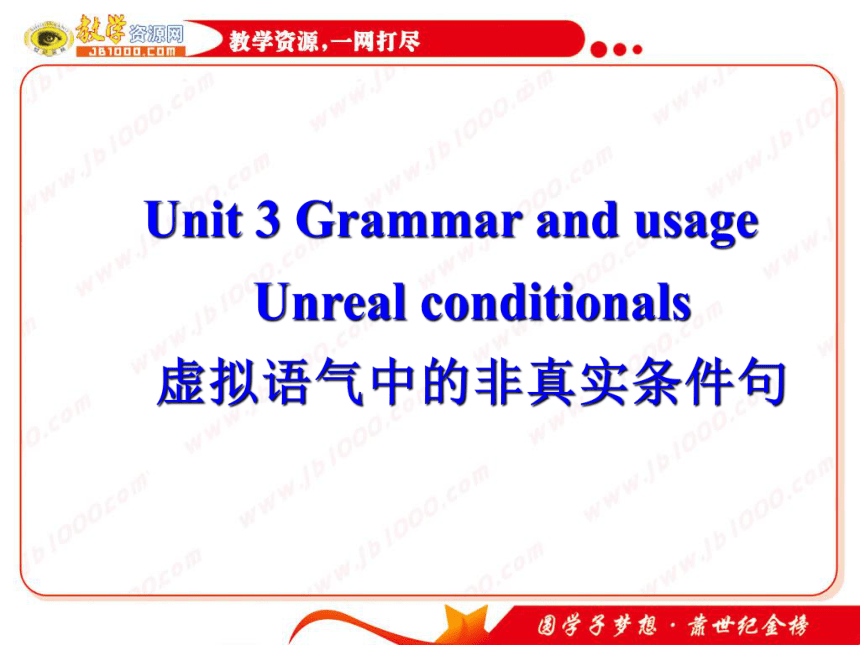
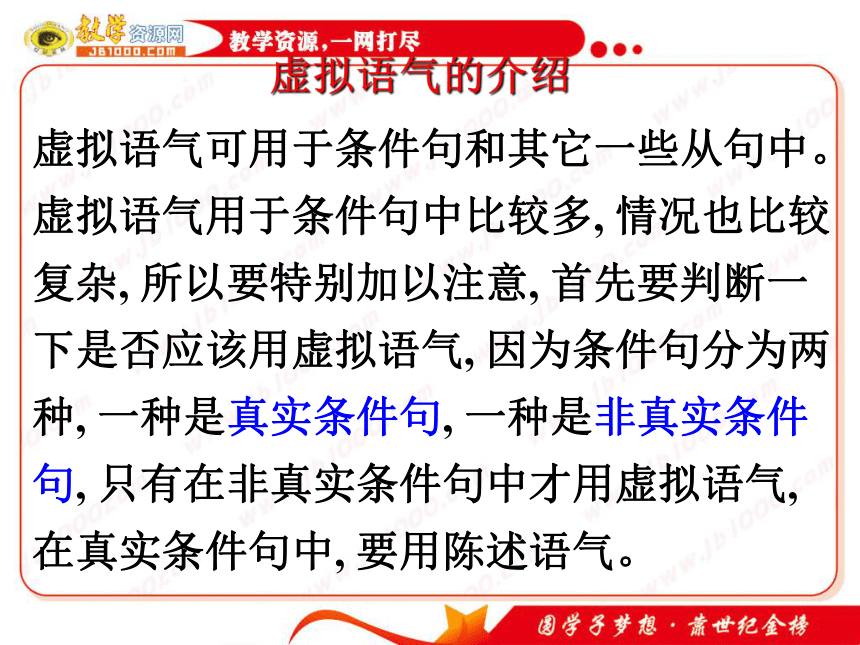
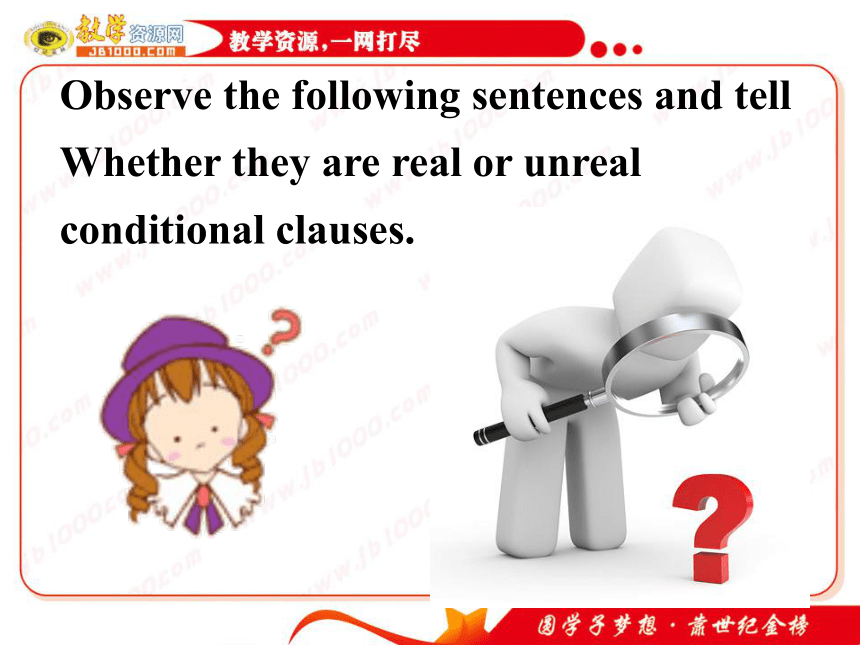
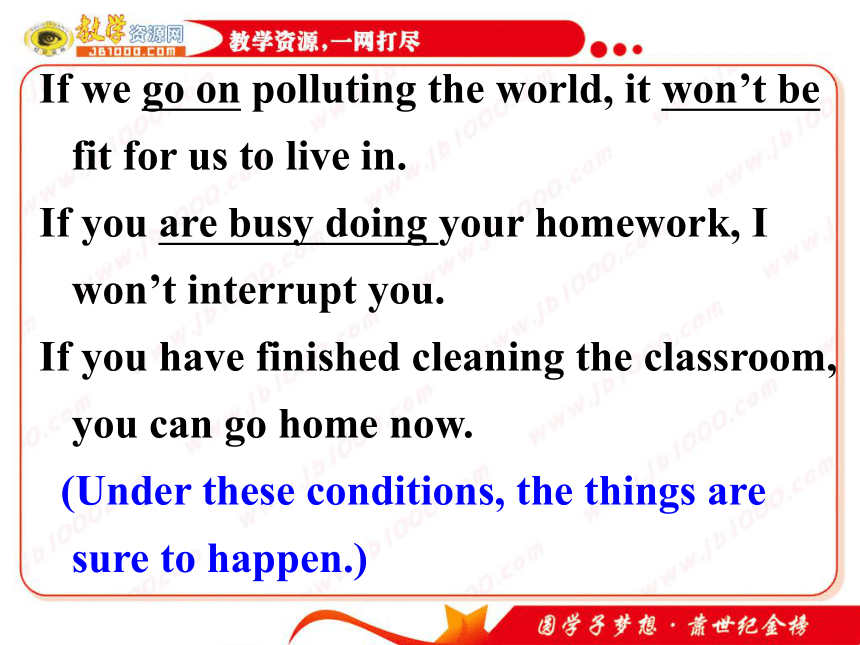

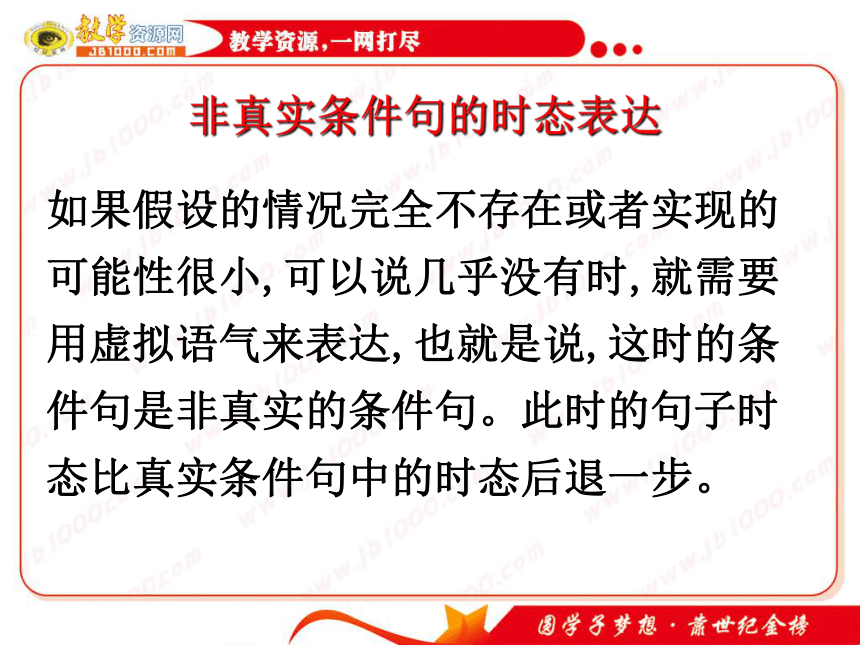
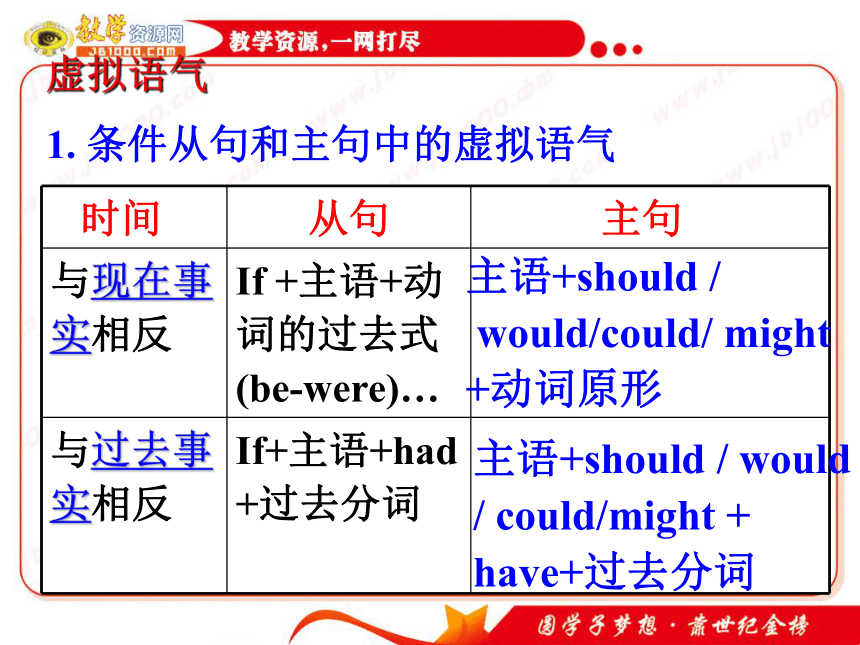
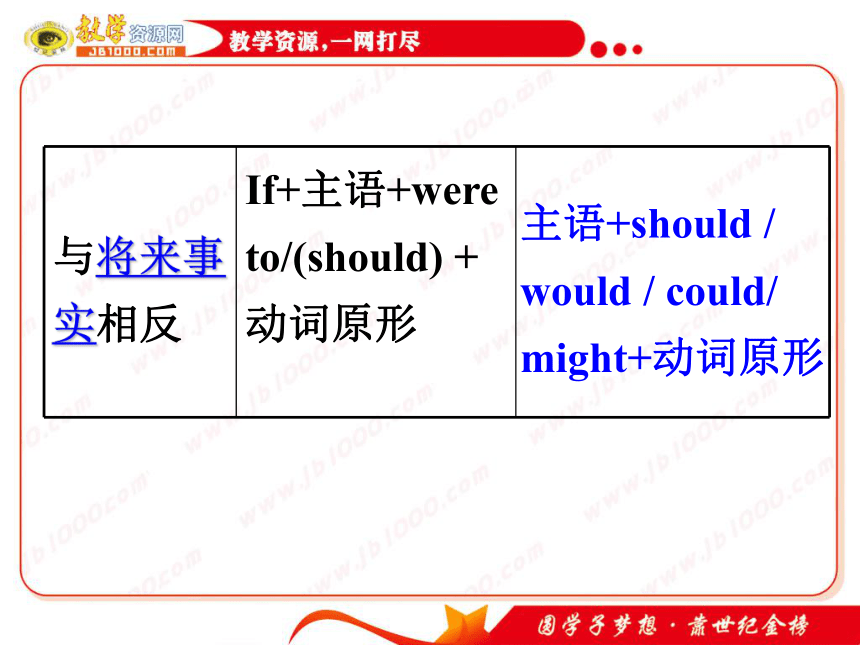
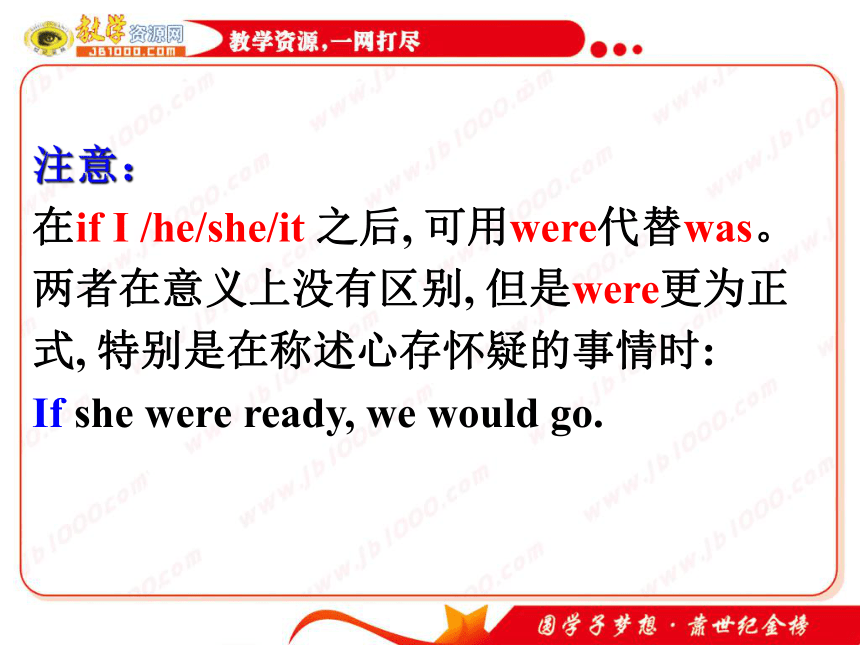

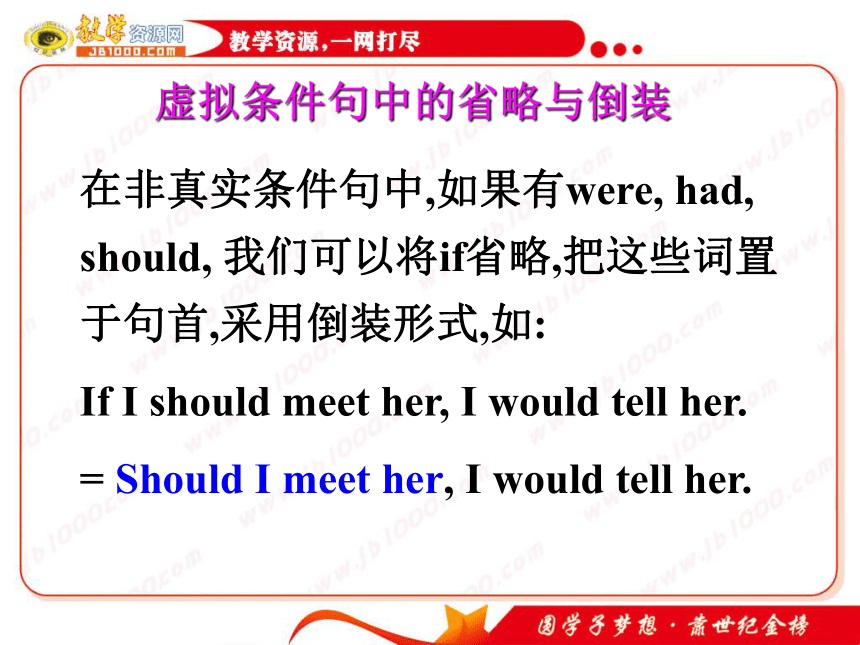
文档简介
(共50张PPT)
牛津版
高二 模块六Unit 3
Unit 3 Grammar and usage
Unreal conditionals
虚拟语气中的非真实条件句
虚拟语气可用于条件句和其它一些从句中。虚拟语气用于条件句中比较多, 情况也比较复杂, 所以要特别加以注意, 首先要判断一下是否应该用虚拟语气, 因为条件句分为两种, 一种是真实条件句, 一种是非真实条件句, 只有在非真实条件句中才用虚拟语气, 在真实条件句中, 要用陈述语气。
虚拟语气的介绍
Observe the following sentences and tell
Whether they are real or unreal
conditional clauses.
If we go on polluting the world, it won’t be fit for us to live in.
If you are busy doing your homework, I won’t interrupt you.
If you have finished cleaning the classroom, you can go home now.
(Under these conditions, the things are sure to happen.)
If there were a lot of good restaurants in the city, this would make it more attractive.
(There aren’t many good restaurant now.)
If a lot of people spoke English, it would be very helpful for tourists.
(Not many people can speak English now.)
非真实条件句的时态表达
如果假设的情况完全不存在或者实现的可能性很小,可以说几乎没有时,就需要用虚拟语气来表达,也就是说,这时的条件句是非真实的条件句。此时的句子时态比真实条件句中的时态后退一步。
虚拟语气
1. 条件从句和主句中的虚拟语气
时间 从句 主句
与现在事实相反 If +主语+动词的过去式(be-were)…
与过去事实相反 If+主语+had +过去分词
主语+should /
would/could/ might
+动词原形
主语+should / would
/ could/might +
have+过去分词
与将来事实相反 If+主语+were to/(should) + 动词原形
主语+should /
would / could/
might+动词原形
注意:
在if I /he/she/it 之后, 可用were代替was。两者在意义上没有区别, 但是were更为正式, 特别是在称述心存怀疑的事情时:
If she were ready, we would go.
在与将来事实相反的条件从句中,我们可以用were to或should +do来表示,如:
If I were to fail my English test, I would have to take it again at the end of the term.
If he should come tomorrow, I would talk to him about it.
在非真实条件句中,如果有were, had, should, 我们可以将if省略,把这些词置于句首,采用倒装形式,如:
If I should meet her, I would tell her.
= Should I meet her, I would tell her.
虚拟条件句中的省略与倒装
If I were in your position, I would do it better.
= Were I in your position, I would do it better.
If they had made preparations, they would have succeeded.
=Had they made preparations, they would have succeeded.
有时非真实条件句中, 主句谓语动词所表示的动作和条件从句中谓语动词所表示的动作并不同时发生, 这时动词的形式并不完全按照上述表格来进行, 而需要按照各自的时间来调整, 这样的句子就叫错综时间条件句。
错综时间条件句
e.g.
If you had followed the doctor’s advice, then you would be all right now.
If I hadn’t finished my composition by now, I would be working on it tomorrow.
If she had prepared well for her lessons yesterday, she wouldn’t have so many difficulties now.
有时一个假设的情况并不用条件从句表示,而用其它方式来表示,这样的句子叫含蓄条件句。
用with, without等介词短语或分词短语或者独立主格结构来代替条件从句。
含蓄条件句
e.g. We might have died without your help.
=We might have died if you hadn’t
helped us.
Having known in time, we could have
stopped it.
= If we had known in time, we could
stopped it.
在条件从句中除最常见的连词之外,尚有下列连词: otherwise; in case; but that; on condition that; unless; suppose/supposing (that); so long as; provided/providing (that)
2. 用相当于if 的其他连词表示虚拟结构
e.g.
I was busy last week, otherwise I would have come to see you.
But that you had offered help, they couldn’t have finished their work on time.
I would have given you more money, but I was poor then.
I would have called you, but I forgot your telephone number.
3. 通过上下文来虚拟
固定句式的虚拟语气
should+动词原形; should可以省略:
① demand, suggest, advise, propose, insist, order, request, desire, urge, deserve, recommend, intend等词后所跟的宾语从句中
② It + be + suggested / demanded + that 引导的主语从句
③ suggestion, proposal 引导的同位语从句
④ It is+ important / necessary + that 从句
⑤ for fear that (惟恐) 引导的从句中须
用should+动词原形
固定句式的虚拟语气, 从句中用过去式(从句中, 如果表示与现在事实相反, 谓语动词用过去式; 如果表示与过去事实相反, 谓语动词用过去完成式。)
as if, as though, wish, would rather, if only
It’s high (about) time + 从句时, 从句谓语动词只能用过去式。
(1)___________ (2)___________
(3)___________ (4)___________
(5)___________ (6)___________
(7)___________ (8)___________
(9)___________ (10)__________
(11)___________ (12)___________
(13)___ (14)_________ (15)__________
Answers
went
would expect
went
went
went
would give
would see
would be
did
had travelled
would have found
would take
had
would join
would know
Language points
In my youth, if I could have travelled …
and needed another wage. (P41)
wage n. 工资,工钱 一般指工人等体力劳
动者的“工资、工钱”,通常按时或按天
计算,分周发给,常用复数形式。
e.g. His wages are 50 pounds a week.
他的工资每周五十镑。
词语辨析
wage与 salary, pay, income
▲ salary一般指机关单位官员、职员和管理人员的“薪金”,一般按年计算,分月或半月发给,常用作可数名词。
e.g. He accepted the position, but asked so
small a salary.
他接受了这一职位,但要求的薪水很低。
▲ pay指因做工作而获得的报酬,既可指wage,也可指salary,也可指军队的薪饷或津贴。如:
I like the work but the pay is terrible.
我挺喜欢这份工作,但就是报酬太少了。
We practice the policy of equal pay for equal work. 我们实行同工同酬的政策。
▲ income意为“收入”,它不仅限于指个人的工资,也可指一个国家的总收入。
e.g.
He has an income of ten thousand yuan a year. 他每年有一万元的收入。
He deceived his friends about his income.
他在自己的收入问题上欺骗了朋友。
[比较]
① He has low pay.
(他得到的报酬“pay”不高,但没有说明何种报酬。)
② He has a low salary.
(用salary传达了这样一个信息:他从事文职工作,工资不高。)
③ He has a low wage.
(用wage传达了这样一个信息:他是普通
工人,工资不高。)
④ He has a low income.
(用income表明他的收入低。)
高考链接
1. I have no idea what he will do with them all and it took up a lot of time. (P42)
[考点1] idea作先行词时的同位语从句。
[考例] Do you have any idea _____ is actually going on in the classroom (辽2005)
A. that B. what C. as D. which
[点拨] 选B。what 在同位语从句中作主语。
[考点2] take up
[考例1] After he retired from office, Rogers _____ painting for a while, but soon lost interest. (山东2006)
A. took up B. saved up
C. kept up D. drew up
[点拨] 选A。take up在这里是“开始学习”的意思。save up储蓄;keep up维持,继续; draw up拟定,起草。
[考例2] Helen always helps her mother even though going to school ______ most of her day. (广东2004)
A. takes up B. makes up
C. saves up D. puts up
[点拨] 选A。take up占用时间。make up编造,和解,弥补;put up举起,张帖。
2. He seemed to give out a lot of business
cards and got a bit upset when my
classmate did not go through the proper
procedure and just put it in his pocket
without looking at it. (P42)
[考点] give out
[考例1] What shall we use for power when all the oil in the world has ______ (山东05)
A. given out B. put out
C. held up D. used up
[点拨] 选A。give out在这里的意思为“用完,耗尽”。put out使熄灭,吹灭,扑灭;hold up举起,耽误;use up也是“用完,耗尽”的意思,但应该使用被动语态。
[考例2] The news of the mayor’s coming to our school for a visit was ______ on the radio yesterday. (福建2007)
A. turned out B. found out
C. given out D. carried out
[点拨] 选C。give out在这里的意思是“(消息等的)宣布,发布”。turn out结果是,证明是;find out查明,了解,发现;carry out实施,执行。
_______ for the free tickets, I would not have gone to the films so often.
A. If it is not B. Were it not
C. Had it not been D. If they were not
Practice
2. He came late, otherwise he _______
the first bus.
A. caught B. would catch
C. would have caught D. had caught
3. Mary was going to the wedding if her
friend ________ her.
A. hadn’t called on B. didn’t call at
C. didn’t call on D. hadn’t called at
4. ---Let’s stop watching the boring TV
programme, Jack!
---If you don’t watch it, I ____ , either.
A. don’t B. won’t
C. am not D. stop
5.---Shall I tell John about the bad news
---No, you ____. I think that will
make him sad.
A. needn’t B. wouldn’t
C. shouldn’t D. mustn’t
6. Why did you throw the bottle out of the window You ____ somebody.
A. might hurt B. could have hurt
C. would hurt D. must have hurt
7.---Mum, may I got out and play
---No, you _______ .
A. won’t B. don’t
C. aren’t able to D. can’t
8. From what I hear about their hotel and the weather, they ___ their holiday very much.
A. would have enjoyed
B. shouldn’t have enjoyed
C. needn’t have enjoyed
D. can’t have enjoyed
9.---Did you hear me come in last night
---No, I _____ asleep.
A. can’t be B. must be
C. must have been
D. couldn’t have been
10.---I’ll pay you by cheque monthly.
---I’d rather you ____ me cash weekly.
A. pay B. will pay
C. are to pay D. paid
11. They didn’t want to come with us at first. But then we ______ persuade them.
A. had managed to B. were able to
C. did try to D. would have to
12. The doctor said, “Sir, you _____ be
sitting in this waiting room. It’s for
the children only.”
A. oughtn’t to B. can’t
C. mustn’t D. won’t
13. ---Did Wei Hua have breakfast
before going to school yesterday
---No, but I think he _____ have.
A. will B. may C. should D. must
14. I would have informed her if possible, but I _______ so busy.
A. were B. had been
C. was D. would be
15.---No one was prepared for Mr. Hill’s
questions.
---I guess we ____ the lesson last night.
A.I would read B. ought to read
C. should have read D. had read
Magic Lantern
Magic Brush
Discussion
What would you do if you had a…
Time Machine
One million
Homework
1. Finish Parts C1 and C2 on Page 118
in Workbook.
2. Write a short passage about what
would you do if you had … .
牛津版
高二 模块六Unit 3
Unit 3 Grammar and usage
Unreal conditionals
虚拟语气中的非真实条件句
虚拟语气可用于条件句和其它一些从句中。虚拟语气用于条件句中比较多, 情况也比较复杂, 所以要特别加以注意, 首先要判断一下是否应该用虚拟语气, 因为条件句分为两种, 一种是真实条件句, 一种是非真实条件句, 只有在非真实条件句中才用虚拟语气, 在真实条件句中, 要用陈述语气。
虚拟语气的介绍
Observe the following sentences and tell
Whether they are real or unreal
conditional clauses.
If we go on polluting the world, it won’t be fit for us to live in.
If you are busy doing your homework, I won’t interrupt you.
If you have finished cleaning the classroom, you can go home now.
(Under these conditions, the things are sure to happen.)
If there were a lot of good restaurants in the city, this would make it more attractive.
(There aren’t many good restaurant now.)
If a lot of people spoke English, it would be very helpful for tourists.
(Not many people can speak English now.)
非真实条件句的时态表达
如果假设的情况完全不存在或者实现的可能性很小,可以说几乎没有时,就需要用虚拟语气来表达,也就是说,这时的条件句是非真实的条件句。此时的句子时态比真实条件句中的时态后退一步。
虚拟语气
1. 条件从句和主句中的虚拟语气
时间 从句 主句
与现在事实相反 If +主语+动词的过去式(be-were)…
与过去事实相反 If+主语+had +过去分词
主语+should /
would/could/ might
+动词原形
主语+should / would
/ could/might +
have+过去分词
与将来事实相反 If+主语+were to/(should) + 动词原形
主语+should /
would / could/
might+动词原形
注意:
在if I /he/she/it 之后, 可用were代替was。两者在意义上没有区别, 但是were更为正式, 特别是在称述心存怀疑的事情时:
If she were ready, we would go.
在与将来事实相反的条件从句中,我们可以用were to或should +do来表示,如:
If I were to fail my English test, I would have to take it again at the end of the term.
If he should come tomorrow, I would talk to him about it.
在非真实条件句中,如果有were, had, should, 我们可以将if省略,把这些词置于句首,采用倒装形式,如:
If I should meet her, I would tell her.
= Should I meet her, I would tell her.
虚拟条件句中的省略与倒装
If I were in your position, I would do it better.
= Were I in your position, I would do it better.
If they had made preparations, they would have succeeded.
=Had they made preparations, they would have succeeded.
有时非真实条件句中, 主句谓语动词所表示的动作和条件从句中谓语动词所表示的动作并不同时发生, 这时动词的形式并不完全按照上述表格来进行, 而需要按照各自的时间来调整, 这样的句子就叫错综时间条件句。
错综时间条件句
e.g.
If you had followed the doctor’s advice, then you would be all right now.
If I hadn’t finished my composition by now, I would be working on it tomorrow.
If she had prepared well for her lessons yesterday, she wouldn’t have so many difficulties now.
有时一个假设的情况并不用条件从句表示,而用其它方式来表示,这样的句子叫含蓄条件句。
用with, without等介词短语或分词短语或者独立主格结构来代替条件从句。
含蓄条件句
e.g. We might have died without your help.
=We might have died if you hadn’t
helped us.
Having known in time, we could have
stopped it.
= If we had known in time, we could
stopped it.
在条件从句中除最常见的连词之外,尚有下列连词: otherwise; in case; but that; on condition that; unless; suppose/supposing (that); so long as; provided/providing (that)
2. 用相当于if 的其他连词表示虚拟结构
e.g.
I was busy last week, otherwise I would have come to see you.
But that you had offered help, they couldn’t have finished their work on time.
I would have given you more money, but I was poor then.
I would have called you, but I forgot your telephone number.
3. 通过上下文来虚拟
固定句式的虚拟语气
should+动词原形; should可以省略:
① demand, suggest, advise, propose, insist, order, request, desire, urge, deserve, recommend, intend等词后所跟的宾语从句中
② It + be + suggested / demanded + that 引导的主语从句
③ suggestion, proposal 引导的同位语从句
④ It is+ important / necessary + that 从句
⑤ for fear that (惟恐) 引导的从句中须
用should+动词原形
固定句式的虚拟语气, 从句中用过去式(从句中, 如果表示与现在事实相反, 谓语动词用过去式; 如果表示与过去事实相反, 谓语动词用过去完成式。)
as if, as though, wish, would rather, if only
It’s high (about) time + 从句时, 从句谓语动词只能用过去式。
(1)___________ (2)___________
(3)___________ (4)___________
(5)___________ (6)___________
(7)___________ (8)___________
(9)___________ (10)__________
(11)___________ (12)___________
(13)___ (14)_________ (15)__________
Answers
went
would expect
went
went
went
would give
would see
would be
did
had travelled
would have found
would take
had
would join
would know
Language points
In my youth, if I could have travelled …
and needed another wage. (P41)
wage n. 工资,工钱 一般指工人等体力劳
动者的“工资、工钱”,通常按时或按天
计算,分周发给,常用复数形式。
e.g. His wages are 50 pounds a week.
他的工资每周五十镑。
词语辨析
wage与 salary, pay, income
▲ salary一般指机关单位官员、职员和管理人员的“薪金”,一般按年计算,分月或半月发给,常用作可数名词。
e.g. He accepted the position, but asked so
small a salary.
他接受了这一职位,但要求的薪水很低。
▲ pay指因做工作而获得的报酬,既可指wage,也可指salary,也可指军队的薪饷或津贴。如:
I like the work but the pay is terrible.
我挺喜欢这份工作,但就是报酬太少了。
We practice the policy of equal pay for equal work. 我们实行同工同酬的政策。
▲ income意为“收入”,它不仅限于指个人的工资,也可指一个国家的总收入。
e.g.
He has an income of ten thousand yuan a year. 他每年有一万元的收入。
He deceived his friends about his income.
他在自己的收入问题上欺骗了朋友。
[比较]
① He has low pay.
(他得到的报酬“pay”不高,但没有说明何种报酬。)
② He has a low salary.
(用salary传达了这样一个信息:他从事文职工作,工资不高。)
③ He has a low wage.
(用wage传达了这样一个信息:他是普通
工人,工资不高。)
④ He has a low income.
(用income表明他的收入低。)
高考链接
1. I have no idea what he will do with them all and it took up a lot of time. (P42)
[考点1] idea作先行词时的同位语从句。
[考例] Do you have any idea _____ is actually going on in the classroom (辽2005)
A. that B. what C. as D. which
[点拨] 选B。what 在同位语从句中作主语。
[考点2] take up
[考例1] After he retired from office, Rogers _____ painting for a while, but soon lost interest. (山东2006)
A. took up B. saved up
C. kept up D. drew up
[点拨] 选A。take up在这里是“开始学习”的意思。save up储蓄;keep up维持,继续; draw up拟定,起草。
[考例2] Helen always helps her mother even though going to school ______ most of her day. (广东2004)
A. takes up B. makes up
C. saves up D. puts up
[点拨] 选A。take up占用时间。make up编造,和解,弥补;put up举起,张帖。
2. He seemed to give out a lot of business
cards and got a bit upset when my
classmate did not go through the proper
procedure and just put it in his pocket
without looking at it. (P42)
[考点] give out
[考例1] What shall we use for power when all the oil in the world has ______ (山东05)
A. given out B. put out
C. held up D. used up
[点拨] 选A。give out在这里的意思为“用完,耗尽”。put out使熄灭,吹灭,扑灭;hold up举起,耽误;use up也是“用完,耗尽”的意思,但应该使用被动语态。
[考例2] The news of the mayor’s coming to our school for a visit was ______ on the radio yesterday. (福建2007)
A. turned out B. found out
C. given out D. carried out
[点拨] 选C。give out在这里的意思是“(消息等的)宣布,发布”。turn out结果是,证明是;find out查明,了解,发现;carry out实施,执行。
_______ for the free tickets, I would not have gone to the films so often.
A. If it is not B. Were it not
C. Had it not been D. If they were not
Practice
2. He came late, otherwise he _______
the first bus.
A. caught B. would catch
C. would have caught D. had caught
3. Mary was going to the wedding if her
friend ________ her.
A. hadn’t called on B. didn’t call at
C. didn’t call on D. hadn’t called at
4. ---Let’s stop watching the boring TV
programme, Jack!
---If you don’t watch it, I ____ , either.
A. don’t B. won’t
C. am not D. stop
5.---Shall I tell John about the bad news
---No, you ____. I think that will
make him sad.
A. needn’t B. wouldn’t
C. shouldn’t D. mustn’t
6. Why did you throw the bottle out of the window You ____ somebody.
A. might hurt B. could have hurt
C. would hurt D. must have hurt
7.---Mum, may I got out and play
---No, you _______ .
A. won’t B. don’t
C. aren’t able to D. can’t
8. From what I hear about their hotel and the weather, they ___ their holiday very much.
A. would have enjoyed
B. shouldn’t have enjoyed
C. needn’t have enjoyed
D. can’t have enjoyed
9.---Did you hear me come in last night
---No, I _____ asleep.
A. can’t be B. must be
C. must have been
D. couldn’t have been
10.---I’ll pay you by cheque monthly.
---I’d rather you ____ me cash weekly.
A. pay B. will pay
C. are to pay D. paid
11. They didn’t want to come with us at first. But then we ______ persuade them.
A. had managed to B. were able to
C. did try to D. would have to
12. The doctor said, “Sir, you _____ be
sitting in this waiting room. It’s for
the children only.”
A. oughtn’t to B. can’t
C. mustn’t D. won’t
13. ---Did Wei Hua have breakfast
before going to school yesterday
---No, but I think he _____ have.
A. will B. may C. should D. must
14. I would have informed her if possible, but I _______ so busy.
A. were B. had been
C. was D. would be
15.---No one was prepared for Mr. Hill’s
questions.
---I guess we ____ the lesson last night.
A.I would read B. ought to read
C. should have read D. had read
Magic Lantern
Magic Brush
Discussion
What would you do if you had a…
Time Machine
One million
Homework
1. Finish Parts C1 and C2 on Page 118
in Workbook.
2. Write a short passage about what
would you do if you had … .
